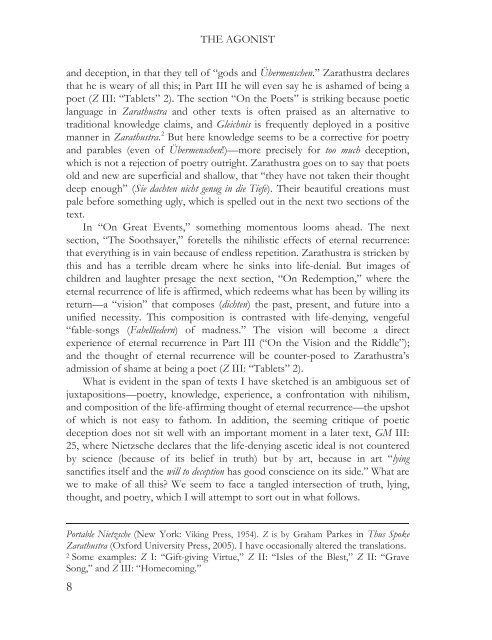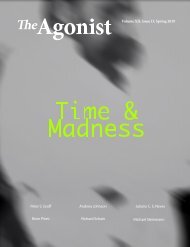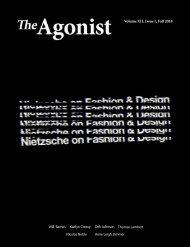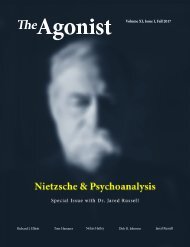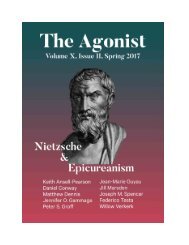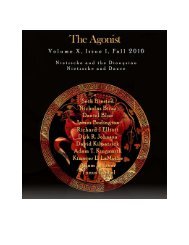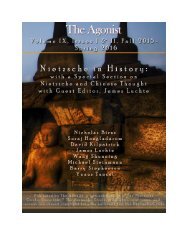Volume XI, Issue II, Spring 2018
Create successful ePaper yourself
Turn your PDF publications into a flip-book with our unique Google optimized e-Paper software.
THE AGONIST<br />
and deception, in that they tell of “gods and Übermenschen.” Zarathustra declares<br />
that he is weary of all this; in Part <strong>II</strong>I he will even say he is ashamed of being a<br />
poet (Z <strong>II</strong>I: “Tablets” 2). The section “On the Poets” is striking because poetic<br />
language in Zarathustra and other texts is often praised as an alternative to<br />
traditional knowledge claims, and Gleichnis is frequently deployed in a positive<br />
manner in Zarathustra. 2 But here knowledge seems to be a corrective for poetry<br />
and parables (even of Übermenschen!)—more precisely for too much deception,<br />
which is not a rejection of poetry outright. Zarathustra goes on to say that poets<br />
old and new are superficial and shallow, that “they have not taken their thought<br />
deep enough” (Sie dachten nicht genug in die Tiefe). Their beautiful creations must<br />
pale before something ugly, which is spelled out in the next two sections of the<br />
text.<br />
In “On Great Events,” something momentous looms ahead. The next<br />
section, “The Soothsayer,” foretells the nihilistic effects of eternal recurrence:<br />
that everything is in vain because of endless repetition. Zarathustra is stricken by<br />
this and has a terrible dream where he sinks into life-denial. But images of<br />
children and laughter presage the next section, “On Redemption,” where the<br />
eternal recurrence of life is affirmed, which redeems what has been by willing its<br />
return—a “vision” that composes (dichten) the past, present, and future into a<br />
unified necessity. This composition is contrasted with life-denying, vengeful<br />
“fable-songs (Fabelliedern) of madness.” The vision will become a direct<br />
experience of eternal recurrence in Part <strong>II</strong>I (“On the Vision and the Riddle”);<br />
and the thought of eternal recurrence will be counter-posed to Zarathustra’s<br />
admission of shame at being a poet (Z <strong>II</strong>I: “Tablets” 2).<br />
What is evident in the span of texts I have sketched is an ambiguous set of<br />
juxtapositions—poetry, knowledge, experience, a confrontation with nihilism,<br />
and composition of the life-affirming thought of eternal recurrence—the upshot<br />
of which is not easy to fathom. In addition, the seeming critique of poetic<br />
deception does not sit well with an important moment in a later text, GM <strong>II</strong>I:<br />
25, where Nietzsche declares that the life-denying ascetic ideal is not countered<br />
by science (because of its belief in truth) but by art, because in art “lying<br />
sanctifies itself and the will to deception has good conscience on its side.” What are<br />
we to make of all this? We seem to face a tangled intersection of truth, lying,<br />
thought, and poetry, which I will attempt to sort out in what follows.<br />
Portable Nietzsche (New York: Viking Press, 1954). Z is by Graham Parkes in Thus Spoke<br />
Zarathustra (Oxford University Press, 2005). I have occasionally altered the translations.<br />
2 Some examples: Z I: “Gift-giving Virtue,” Z <strong>II</strong>: “Isles of the Blest,” Z <strong>II</strong>: “Grave<br />
Song,” and Z <strong>II</strong>I: “Homecoming.”<br />
8


